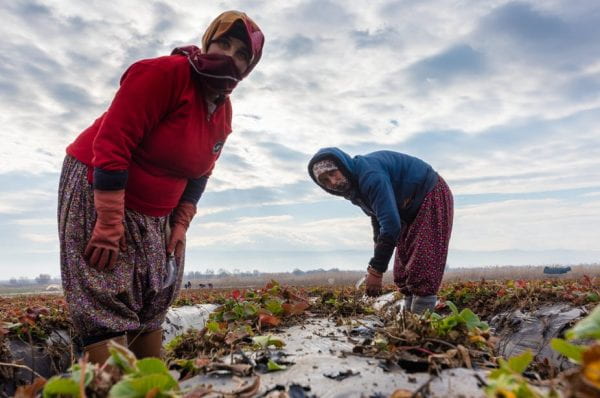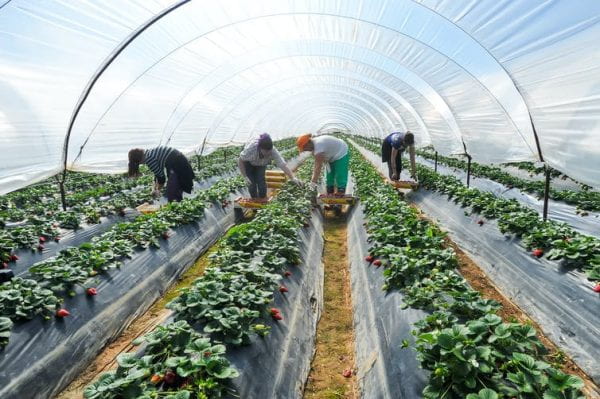
Dr Denny Pencheva
Senior Teaching Associate, Migration Studies and Politics, University of Bristol
In the wake of the COVID-19 pandemic, major agricultural companies and charities have chartered flights to urgently bring in tens of thousands of Bulgarian and Romanian agricultural workers. Flights have headed to places like Karlsruhe and Düsseldorf in Germany, along with Essex and the Midlands in the UK.
This comes after farmers in both countries warned there is a real risk that thousands of tons of produce might be left to rot – further affecting food supply chains – if vacancies for agricultural workers go unfilled.
The excessive demand for food during lockdown has meant that farm labourers are classed as key workers, which is why they are being flown to the UK and other Western European countries.
In the UK, up to 90,000 temporary positions need to be filled within weeks. A national campaign has been launched appealing to students and those who have lost their jobs in bars, cafes and shops to help with the harvest. But so far the scheme only has around 10,000 applicants with even fewer having accepted work contracts due to low pay and demanding terms. This is nowhere near enough to ensure the sustainability of food supply chains.That means that affordable and plentiful fruit and veg in UK supermarkets will come at the price of violating the strict national lockdowns in Bulgaria and Romania.

Affordable and plentiful fruit and veg will come at the price of violating the strict national lockdowns in Bulgaria and Romania.
epic_images/Shutterstock
From ‘go back’ to ‘come back’
As of last year, nearly 98% of fruit pickers in the UK were foreign nationals. The vast majority come from Bulgaria and Romania. Both countries went into full lockdowns earlier in March, banning international travel. Chartering flights when borders are closed and planes grounded is effectively undermining the efforts of the Bulgarian and Romanian governments to manage the current health crisis.
The European Commission has banned non-essential travel while speeding up the mobility of key workers – a recognition of Western European dependency on Eastern European labour. The Bulgarian and Romanian governments have also been lax and have not insisted that Western European employers provide comprehensive health insurance for agricultural workers.

Farmers have said that without the workforce, crops may be left in the ground to rot and be wasted. Ververidis Vasilis/Shutterstock
Key workers to key spreaders
The reason why the lockdowns in Bulgaria and Romania are particularly strict is because both countries have fast-growing ageing populations.
The share of the population above the age of 65 between 2008 and 2018 is 2.8% for Romania and 3.2% for Bulgaria – both higher than the EU average of 2.6%. Many families also live in multi-generational households, which could put older family members at risk when the younger members return back home.
The exodus of doctors, nurses and care workers from Bulgaria and Romania also means access to medical care in smaller towns and rural areas – where most of these workers come from – will be all but impossible.
If returning migrant workers retrigger the pandemic, the consequences for both countries will be disastrous.
Economic dependency
But herein lies another part of the problem, because the national economies of both countries are heavily dependent on remittances – money sent back home from migrant workers.
For most of these people, seasonal work abroad is the only source of income and there is no safety net. They either stay home unemployed, or risk their (and their families’) health by boarding flights to the UK or Germany.
The financial incentive may be great. But so too are the public health risks. A 57-year old Romanian seasonal worker has already died from COVID-19 in Baden-Württemberg, Germany – begging the question of how many more will follow.
Food for thought
For the most part, the British public has long been disassociated from the realities of low-paid manual labour and has grown accustomed to fresh and inexpensive products produced by a disposable army of migrant workers.
And despite Brexit anxieties about EU migrants stealing British jobs, the COVID-19 pandemic has reminded the public that such labour is essential and won’t be automated anytime soon.
Ultimately though, it shouldn’t be down to migrant workers to fix supply chains during a pandemic – especially when evidence indicates that international mobility is contributing to the spread of the virus. Chartering flights during travel bans and national lockdowns is a dangerous reminder of how exploitative labour overrides political and public health responsibility.
This article is republished from The Conversation under a Creative Commons license, Read the original article.
